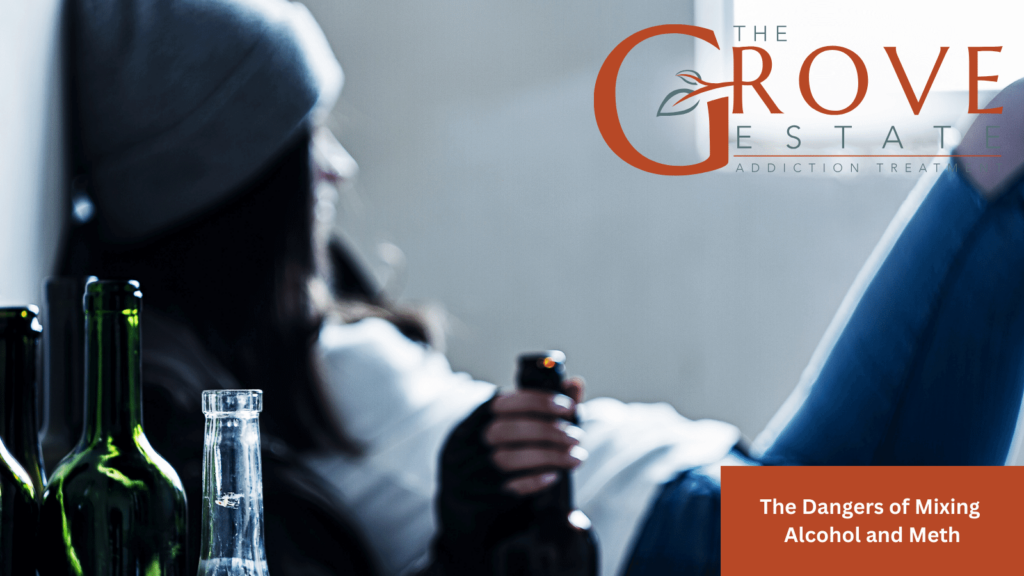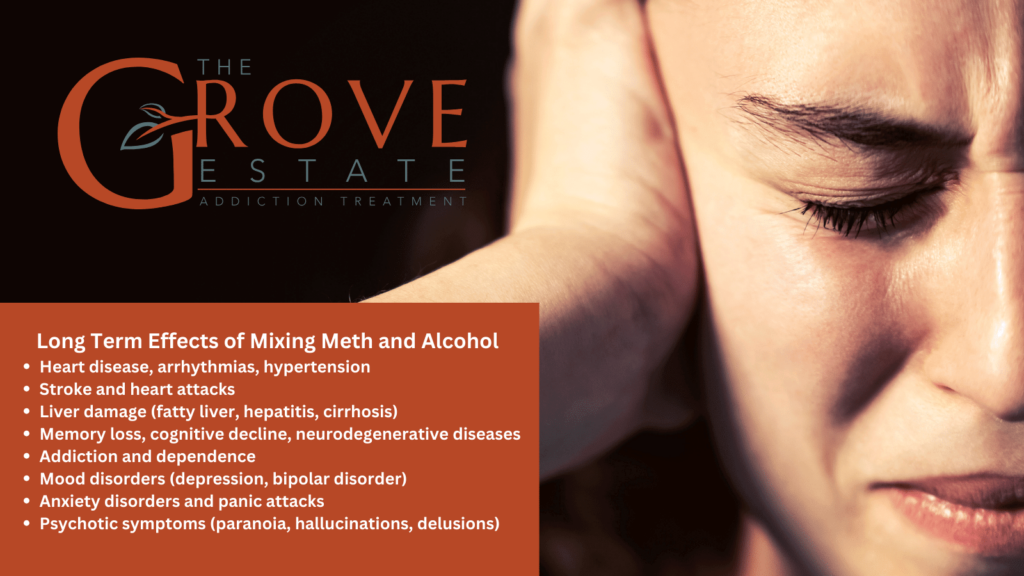In recent years, the trend of mixing alcohol, a depressant, with methamphetamine, a powerful stimulant, has emerged as a grave public health concern. This combination exacerbates the risks associated with each substance, creating a dangerous cocktail with potentially lethal consequences. Alcohol is one of the most widely used psychoactive substances in the world, with global statistics indicating that around 3 million deaths annually are linked to its use, as reported by the World Health Organization. On the other hand, methamphetamine has seen a resurgence in popularity, and according to the National Institutes of Health, overdose deaths involving meth nearly tripled from 2015 to 2019 among people ages 18-64 in the U.S. Meth is characterized by its high potential for addiction and devastating impact on an individual’s physical and mental health.
The interaction between alcohol and meth can lead to an increased risk of overdose, heightened impulsivity, and significant cardiovascular strain. This combination not only magnifies the toxicity and potential for violence but also complicates treatment for addiction and elevates the risk of long-term health issues like heart disease and liver damage. The growing concern among healthcare professionals and public health authorities showcases the need for heightened awareness and informed public health strategies to address this perilous trend.

What is Methamphetamine (Meth)?
Methamphetamine, or meth, is a powerful stimulant that affects the central nervous system, leading to a rapid, euphoric high from dopamine release in the brain. Available in powder and a purer, crystalline form known as crystal meth, the latter is more potent and associated with stronger effects.
While initial use increases activity, reduces appetite, and induces euphoria, meth carries severe risks, including addiction, cardiovascular issues, cognitive decline, and dental problems (“meth mouth”). The pleasurable high is often followed by a significant downturn, or “crash,” resulting in depression and a cycle of reuse to avoid withdrawal and negative after-effects, highlighting its dangerous physical and psychological impact.
How Does Meth Affect the Body?
Methamphetamine profoundly impacts the body, both immediately after use and over the long term. Immediately, meth triggers a rapid release of dopamine, leading to intense euphoria, increased energy, heightened alertness, and decreased appetite.
Immediate Physical Effects:
- Intense euphoria
- Increased energy and alertness
- Decreased appetite
- Rapid heart rate
- Increased blood pressure
- Elevated body temperature
Long-term Physical Effects:
- Chronic heart problems
- Increased risk of stroke
- Dental issues (“meth mouth”)
- Weight loss
- Skin sores (“meth mites”)
- Strain on the cardiovascular system, potentially leading to heart attack or failure
Psychological Impact:
- Anxiety, confusion, and insomnia in the short term
- Mood disturbances and violent behavior over time
- Paranoia, hallucinations, and delusions in chronic users
- Significant cognitive impairments, affecting memory and understanding
What are the Dangers of Mixing Alcohol with Meth?
Mixing alcohol and methamphetamine poses significant dangers due to their opposing effects on the body. Alcohol is a depressant that slows down the brain’s functioning and neural activity, while meth is a powerful stimulant that increases energy and alertness. Here are some of the key risks associated with combining these substances:
- Increased Toxicity: Combining meth and alcohol can lead to an increase in the toxic effects of both substances, potentially causing severe organ damage, particularly to the liver and cardiovascular system.
- Heightened Risk of Overdose: Alcohol can mask the stimulant effects of meth, potentially leading users to consume higher amounts of meth than they can safely tolerate. Similarly, the stimulating effects of meth can lead individuals to drink more alcohol than usual, increasing the risk of alcohol poisoning.
- Severe Dehydration and Heatstroke: Meth can increase physical activity and decrease the perception of needing to drink water, while alcohol can dehydrate the body. Together, they can significantly increase the risk of dehydration and heatstroke.
- Compromised Judgment and Increased Risky Behavior: The combination of meth and alcohol can lead to significantly impaired judgment and increased impulsivity, resulting in risky behaviors such as unsafe sexual practices or driving under the influence.
- Worsened Mental Health Issues: Both meth and alcohol can exacerbate underlying mental health issues such as anxiety, depression, and psychosis. When used together, the risk of severe psychological effects, including paranoia, hallucinations, and aggressive behavior, is increased.
- Complex Withdrawal Symptoms: Using meth and alcohol together can lead to complex withdrawal symptoms that are more severe and difficult to manage than withdrawing from either substance alone.
- Long-Term Health Consequences: Long-term use of meth and alcohol in combination can lead to chronic health issues, including cardiovascular disease, liver damage, cognitive impairments, and mental health disorders.
The dangers of mixing meth and alcohol underscore the importance of addressing substance use comprehensively, recognizing the compounded risks associated with polysubstance abuse.
What is The Risk of Overdose from Meth and Alcohol Combination?
Mixing methamphetamine and alcohol significantly raises the risk of overdose by compounding the effects of both substances. Meth can obscure the depressant effects of alcohol, leading to increased alcohol consumption without feeling its immediate impact. Similarly, alcohol can dull the perceived effects of meth, potentially causing an individual to consume a dangerous amount of the stimulant. This dangerous synergy not only increases the risk of overdose but also complicates the symptoms, making it harder to identify an overdose situation.
Symptoms of Overdose:
- Severe agitation or panic
- Chest pain or heart attack
- Rapid breathing
- Extremely high body temperature
- Hallucinations
- Seizures
In the presence of these symptoms, especially in combination, it’s crucial to seek immediate medical help. The mix of stimulant and depressant properties in these substances can lead to a highly unpredictable and dangerous health emergency, underlining the importance of awareness and quick action in cases of suspected overdose.

What are the Long-Term Consequences of Regularly Mixing Alcohol and Meth?
Mixing alcohol and meth regularly has severe long-term effects on both physical and mental health. Alcohol’s detrimental effects on the liver are amplified by meth. Additionally, this mix can impair brain function, resulting in memory loss, cognitive decline, and a higher risk of Parkinson’s disease. It also makes users more prone to infections such as HIV and hepatitis B and C, particularly through unsafe injection practices.
Physical Health Risks:
- Increased risk of heart disease, arrhythmias, and hypertension.
- Heightened chance of stroke and heart attacks.
- Liver damage, including fatty liver, hepatitis, and cirrhosis.
- Memory loss, cognitive decline, and increased risk of neurodegenerative diseases.
Mental Health Risks:
- Higher risk of addiction and dependence, complicating recovery.
- Mood disorders like depression and bipolar disorder can develop or worsen.
- Increased prevalence of anxiety disorders and panic attacks.
- Potential for psychotic symptoms, such as paranoia, hallucinations, and delusional thinking.
Why Do People Mix Meth and Alcohol?
People mix meth and alcohol for various psychological and social reasons. Psychologically, some seek the heightened euphoria and prolonged energy from meth while using alcohol to temper the edge or come down from the meth high, attempting to balance the stimulant’s effects with the depressants. Social factors also play a significant role; in some environments, the combined use of substances is normalized or even encouraged as part of social bonding or as a means to endure longer periods of social interaction or partying. This combination, despite its dangers, is pursued for its immediate perceived benefits, ignoring the long-term health risks.
What are the Signs and Symptoms of Meth and Alcohol Abuse?
Identifying signs of meth and alcohol abuse is crucial for timely intervention and support. These signs include behavioral changes, physical deterioration, and psychological symptoms that deviate from a person’s normal functioning. Recognizing these signs early can be the first step toward seeking help and recovery.
Signs of Meth Abuse:
- Drastic weight loss
- Dental problems (“meth mouth”)
- Sores on the skin
- Increased talkativeness and activity
- Paranoia or hallucinations
Signs of Alcohol Abuse:
- Slurred speech
- Coordination problems
- Memory lapses or blackouts
- Irritability or mood swings
- Increased tolerance and withdrawal symptoms
What are the Treatment Options for Meth and Alcohol Addiction?
Treatment for meth and alcohol addiction often involves a comprehensive approach, combining medical, psychological, and support mechanisms. Detoxification under medical supervision is the first step to manage withdrawal symptoms safely. Rehabilitation programs, either inpatient or outpatient, provide structured therapy sessions, including cognitive-behavioral therapy (CBT), to address the underlying causes of addiction.
Support groups such as Alcoholics Anonymous (AA) or Narcotics Anonymous (NA) offer ongoing community support. Medication-assisted treatments (MAT) may also be used to reduce cravings and manage withdrawal symptoms for alcohol dependency. It’s important to tailor the treatment plan to the individual’s needs, considering the severity of their addiction and any co-occurring mental health conditions.

How to Get Help for Meth and Alcohol Abuse?
Seeking help for meth and alcohol abuse starts with acknowledging the problem and deciding to make a change. The next step is to reach out to a healthcare provider, who can assess the situation and recommend an appropriate treatment plan. Contacting local addiction services or national helplines can provide information on available treatment facilities and support groups. Engaging with therapy, whether individual, group, or family-based, is crucial for addressing the psychological aspects of addiction. Building a support system through recovery groups and supportive friends and family can also play a key role in successful recovery. Remember, recovery is a journey, and it’s important to seek help and support every step of the way.
Can mixing alcohol and meth affect memory and cognitive function in the long term?
Yes, long-term use of alcohol and meth, either separately or in combination, can lead to significant impairments in memory and cognitive function. This combination can accelerate cognitive decline and increase the risk of developing neurological disorders.
How does the social environment influence the risk of mixing alcohol and meth?
The social environment can play a crucial role in the risk of mixing alcohol and meth. Settings that normalize or encourage the use of multiple substances can significantly increase the likelihood of individuals engaging in this risky behavior. Peer pressure and the desire to fit in or enhance social experiences can also contribute.
What role does tolerance play in the dangers of mixing alcohol and meth?
Tolerance to either alcohol or meth can lead individuals to consume higher amounts of these substances to achieve the desired effects. This increases the risk of overdose and other adverse effects when the two are mixed, as individuals may not accurately judge the amount they can safely consume.
Are there legal implications for being caught using both alcohol and meth?
Yes, there are legal implications for using meth, as it is a controlled substance with severe penalties for possession, use, or distribution. Combining meth with alcohol, especially when driving or engaging in public behavior, can lead to additional legal consequences, including DUI charges, fines, and incarceration.
Can mixing alcohol and meth lead to addiction more quickly?
Mixing alcohol and meth can indeed accelerate the pathway to addiction. The combination of a depressant and a stimulant creates a push-pull effect on the body’s central nervous system, which can lead to an increased psychological dependency on these substances to feel “normal” or balanced. According to Healthline, the interaction between alcohol and Xanax, a scenario similar in its combination of depressant and stimulant effects, showcases how such mixtures can enhance the addictive properties of both substances.
For those struggling with addiction, whether to alcohol, meth, or both, seeking treatment is crucial. Residential rehab provides a structured environment where individuals can receive comprehensive care, including detox, therapy, and support groups. This approach is critical for addressing the complex nature of addiction and laying the foundation for long-term recovery.

Share This Post



